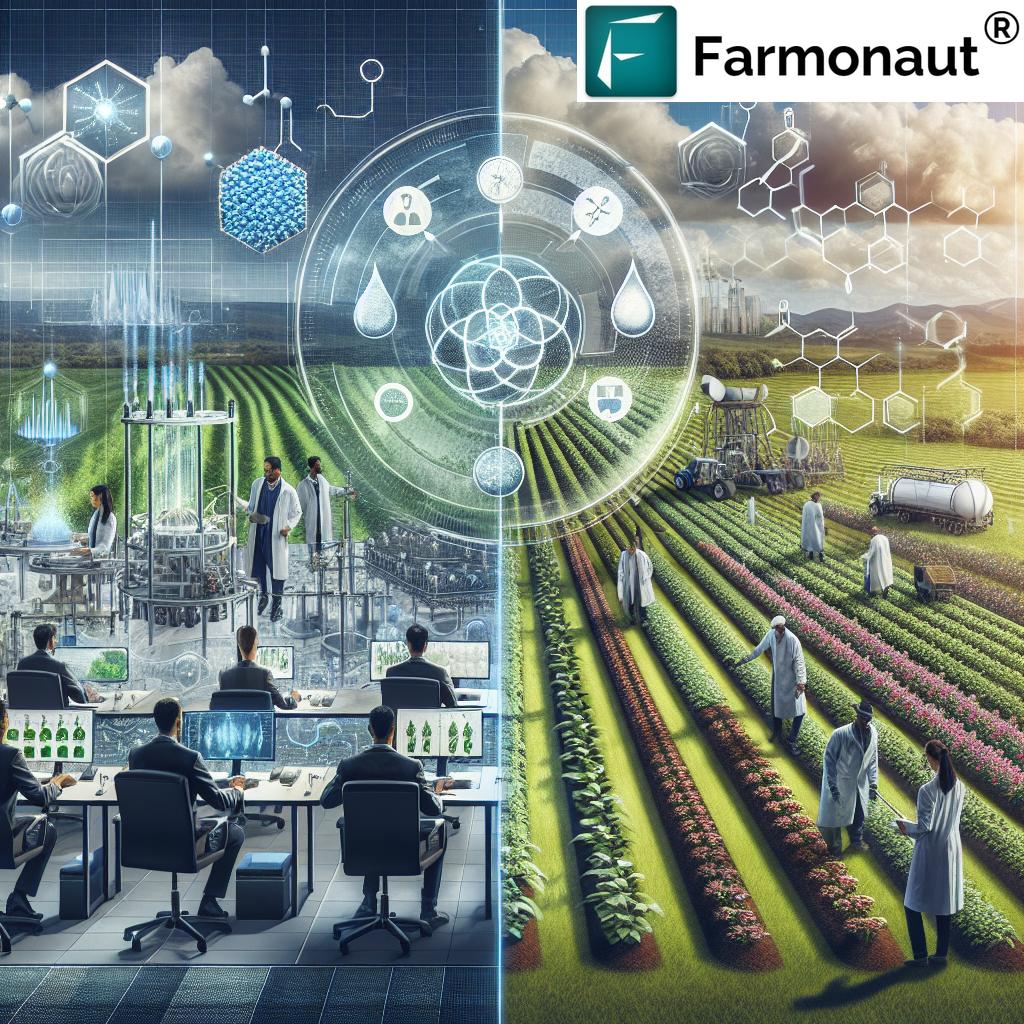Revolutionizing Soil Health: Pioneering Continental-Scale Model for American Producers
“A groundbreaking continental-scale soil health model is being developed, potentially impacting millions of acres of American farmland.”
Welcome to our comprehensive exploration of the latest advancements in soil health modeling and the exciting world of agronomy careers. In this blog post, we’ll delve into the groundbreaking work of a leading soil scientist who has developed a continental-scale framework for assessing soil health, offering American producers a valuable tool for implementing sustainable agriculture practices.
As representatives of Farmonaut, we’re thrilled to share these insights with you. Our mission at Farmonaut is to make precision agriculture accessible and affordable through innovative technology and data-driven insights. While we’ll focus on the broader industry trends in this post, we invite you to explore our services that complement the advancements we’ll discuss.
The Rise of Continental-Scale Soil Research
In recent years, the field of soil science has witnessed a paradigm shift towards large-scale, comprehensive studies. This trend has culminated in the development of a continental-scale soil research model that promises to revolutionize how we understand and manage soil health across America.
- Unprecedented scope: Covering millions of acres
- Integration of diverse data sources
- Application of advanced modeling techniques
This innovative approach to soil health modeling is not just a scientific breakthrough; it’s a game-changer for American producers seeking to optimize their crop yields while maintaining the long-term viability of their land.
The Architect Behind the Model
At the forefront of this revolutionary research is Dr. Kristen Veum, a distinguished soil scientist and the President-Elect of the American Society of Agronomy (ASA). Her work exemplifies the cutting-edge science driving modern agriculture and highlights the critical role of women in agricultural science.
Dr. Veum’s journey in developing this continental-scale framework for soil health assessment is a testament to the power of perseverance and innovation in scientific research. Her work not only advances our understanding of soil dynamics but also provides practical tools for farmers and producers across the country.
The Continental-Scale Model: A Closer Look
The new model developed by Dr. Veum and her team represents a significant leap forward in soil health assessment tools. Here’s what makes it stand out:
- Comprehensive data integration from diverse sources
- Advanced machine learning algorithms for predictive analysis
- Real-time monitoring capabilities
- Scalability from individual farms to entire regions
This model provides producers with unprecedented insights into their soil’s health, enabling more informed soil management decisions.
Impact on Sustainable Agriculture Practices
The implications of this continental-scale soil research for sustainable agriculture practices are profound. By providing a more nuanced and comprehensive understanding of soil health, the model enables:
- Optimized resource allocation
- Reduced environmental impact
- Improved crop resilience
- Enhanced long-term soil fertility
These benefits align perfectly with the growing emphasis on sustainability in modern agriculture, offering a path forward for producers looking to balance productivity with environmental stewardship.
“Women in agricultural science face unique challenges, with mentorship playing a crucial role in advancing their careers and research.”
Women in Agricultural Science: Challenges and Triumphs
Dr. Veum’s success story also sheds light on the experiences of women in agricultural science. Despite significant progress, gender disparities persist in scientific fields, including agronomy and soil science. However, stories like Dr. Veum’s demonstrate the invaluable contributions women make to agricultural research and innovation.
- Overcoming gender biases in STEM fields
- Balancing career demands with personal life
- Breaking through the “glass ceiling” in research leadership
The journey of women in agricultural science underscores the importance of diversity, equity, and inclusion in driving scientific progress and innovation.
The Role of Mentorship in Agricultural Careers
Agricultural mentorship programs play a crucial role in fostering the next generation of soil scientists and agronomists. Dr. Veum’s experience highlights how mentorship can:
- Provide guidance and support for early-career researchers
- Foster networking opportunities within the scientific community
- Encourage persistence in the face of challenges
- Promote diversity in leadership positions
For students and young professionals in agronomy, seeking out mentorship opportunities can be a game-changer in their career development.
Explore Farmonaut’s API for advanced agricultural data integration
Agtech Innovations: Complementing Soil Health Research
While groundbreaking research like Dr. Veum’s continental-scale model advances our understanding of soil health, agtech innovations are making it easier than ever for producers to implement these insights. At Farmonaut, we’re proud to contribute to this ecosystem with our satellite-based farm management solutions.
- Real-time crop health monitoring
- AI-driven advisory systems
- Precision agriculture tools
These technologies complement the continental-scale soil health model by providing farmers with actionable, farm-specific data to inform their management decisions.
The Intersection of Science, Policy, and Education
The development of the continental-scale soil health model exemplifies the crucial intersection of science, policy, and education in shaping the future of agriculture. This interplay is evident in several key areas:
- Policy implications for sustainable land management
- Integration of research findings into agricultural education curricula
- Influence on farm bill provisions and agricultural subsidies
- Collaboration between researchers and federal agencies
As we navigate the challenges of climate change and increasing food demand, this interdisciplinary approach becomes even more critical.
The Future of Agronomy Careers
For those considering a career in agronomy or soil science, the future looks bright. The development of innovative models like Dr. Veum’s creates exciting opportunities for aspiring scientists and researchers. Some promising career paths include:
- Soil health specialists
- Precision agriculture consultants
- Agtech developers
- Environmental policy advisors
These roles offer the chance to make a significant impact on global food security and environmental sustainability.
Check out Farmonaut’s API Developer Docs for integrating agricultural data into your projects
Soil Health Assessment Framework Comparison
| Assessment Criteria | Traditional Methods | Continental-Scale Model Approach | Benefits for Producers |
|---|---|---|---|
| Organic Matter | Lab testing of soil samples | Satellite imagery + AI analysis | 50% faster analysis, wider coverage |
| Nutrient Cycling | Periodic soil tests | Continuous monitoring with sensors | Real-time data for precise fertilization |
| Soil Structure | Visual assessment | 3D soil mapping technology | Improved understanding of soil profiles |
| Water Retention | Field capacity tests | Hydrological modeling + weather data | Optimized irrigation scheduling |
| Biodiversity | Manual species counting | eDNA analysis + machine learning | Comprehensive ecosystem health assessment |
Empowering Producers with Advanced Tools
The continental-scale soil health model represents a significant step forward in empowering producers with advanced tools for sustainable land management. By providing comprehensive, data-driven insights, this model enables farmers to:
- Make more informed decisions about crop rotation and soil amendments
- Implement targeted conservation practices
- Optimize resource use for improved profitability and sustainability
- Contribute to broader environmental goals while maintaining productivity
At Farmonaut, we’re committed to supporting these efforts with our satellite-based farm management solutions, making precision agriculture accessible to farmers of all scales.
The Role of Professional Societies and Conferences
Professional societies like the American Society of Agronomy (ASA) play a crucial role in advancing soil science and agronomy. These organizations facilitate:
- Knowledge sharing through journals and publications
- Networking opportunities at conferences and events
- Advocacy for science-based agricultural policies
- Professional development through webinars and online classroom resources
For students and professionals in the field, active participation in these societies can significantly enhance career prospects and contribute to the advancement of agricultural science.
Addressing Global Challenges Through Soil Science
The continental-scale soil health model is not just a tool for American agriculture; it has global implications. As we face challenges such as climate change, food security, and environmental degradation, innovative approaches to soil management become increasingly crucial. This model contributes to addressing these issues by:
- Providing data to inform climate adaptation strategies
- Enhancing food production efficiency
- Supporting biodiversity conservation efforts
- Informing sustainable land use policies
The work of scientists like Dr. Veum, supported by agtech innovations, is paving the way for a more resilient and sustainable global food system.
The Importance of Continued Research and Innovation
While the continental-scale soil health model represents a significant breakthrough, it’s important to recognize that soil science and agronomy are ever-evolving fields. Continued research and innovation are essential to:
- Refine and improve existing models
- Develop new technologies for soil health assessment
- Adapt to changing environmental conditions
- Address emerging agricultural challenges
This ongoing work requires sustained support from academic institutions, government agencies, and private sector partners.
Conclusion: A New Era for Soil Health and Sustainable Agriculture
The development of the continental-scale soil health model marks the beginning of a new era in agricultural science and practice. By providing unprecedented insights into soil dynamics across vast areas, this innovative approach empowers producers, researchers, and policymakers to make more informed decisions about land management and agricultural practices.
As we look to the future, the integration of advanced soil health models with cutting-edge agtech solutions like those offered by Farmonaut promises to revolutionize agriculture. Together, these tools will help us build a more sustainable, productive, and resilient food system capable of meeting the challenges of the 21st century.
We encourage all stakeholders in the agricultural sector – from students and researchers to farmers and policymakers – to engage with these exciting developments. By embracing innovation and collaboration, we can work together to ensure a healthy, productive future for our soils and the communities that depend on them.
FAQ Section
Q: What is the continental-scale soil health model?
A: It’s a comprehensive framework developed by soil scientists to assess and monitor soil health across large geographic areas, providing detailed insights for agricultural management.
Q: How does this model benefit American producers?
A: The model offers farmers more accurate and timely information about their soil health, enabling better decision-making for crop management, resource allocation, and sustainable practices.
Q: What role do women play in agricultural science?
A: Women are making significant contributions to agricultural science, including leading research projects, developing innovative models, and advancing sustainable farming practices.
Q: How can students get involved in soil science and agronomy?
A: Students can join professional societies, participate in research projects, attend conferences, and seek internships or mentorship opportunities in the field.
Q: What is the connection between soil health and climate change?
A: Healthy soils play a crucial role in mitigating climate change by sequestering carbon and improving resilience to extreme weather events.


















